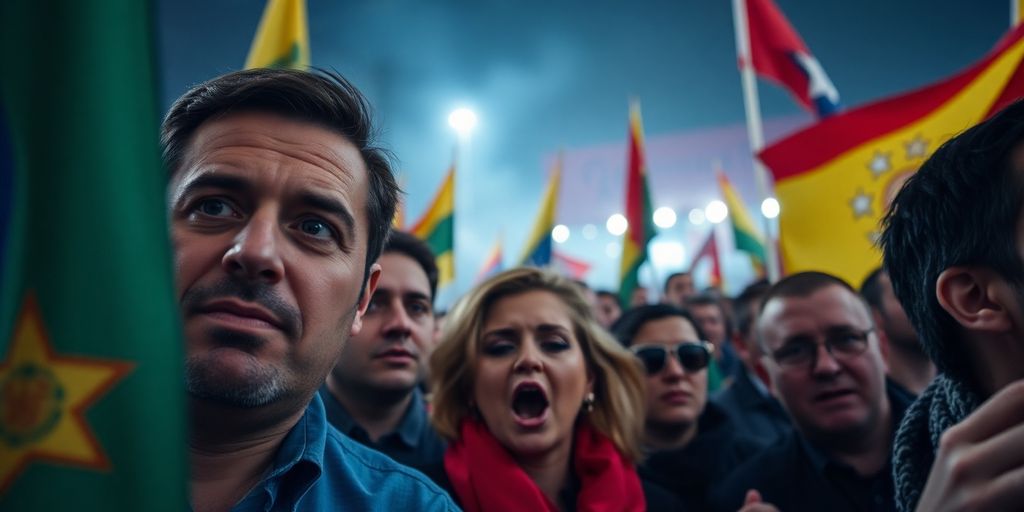Bosnia and Herzegovina is currently facing a significant political crisis as Milorad Dodik, the leader of the Serb-majority entity Republika Srpska, openly defies court rulings and escalates separatist rhetoric. This situation has raised alarms both domestically and internationally, threatening the fragile peace established by the Dayton Accords.
Key Takeaways
- Milorad Dodik faces a nationwide arrest warrant for defying court orders.
- The political landscape is increasingly unstable, with Dodik enacting laws that challenge state authority.
- International community expresses deep concern over rising tensions and potential violence.
Background of the Crisis
The political turmoil in Bosnia has roots in the complex structure established by the Dayton Accords, which ended the brutal war in the 1990s. The accords aimed to maintain peace among Bosnia’s three main ethnic groups: Bosniaks, Serbs, and Croats. However, recent actions by Dodik have threatened this delicate balance.
In February 2025, a Sarajevo court convicted Dodik for defying the orders of the international peace envoy, Christian Schmidt. He was sentenced to one year in prison and barred from holding public office for six years. Despite this, Dodik has rejected the court’s legitimacy and vowed to continue his political activities.
Dodik’s Defiance and New Laws
In response to his conviction, Dodik’s government enacted controversial laws that effectively ban the operation of state-level security and judicial institutions within Republika Srpska. This move is seen as a direct challenge to the authority of the central government and the international community.
Key Legislative Actions:
- Laws passed to prohibit state police and judiciary from operating in Republika Srpska.
- Dodik claims these laws are necessary for the protection of the Serb population.
Dodik’s actions have drawn sharp criticism from both domestic and international observers. The U.S. and EU have condemned his separatist rhetoric, warning that such actions could lead to further instability in the region.
International Response
The international community has reacted with alarm to Dodik’s defiance. NATO Secretary General Mark Rutte reaffirmed support for Bosnia’s territorial integrity during a recent visit, emphasizing that any actions undermining the Dayton Agreement are unacceptable. He stated:
"Inflammatory rhetoric and actions are dangerous; they pose a direct threat to Bosnia and Herzegovina’s stability and security."
Additionally, the European Union peacekeeping force, EUFOR, has increased its troop presence in the country to deter potential violence. Key figures in the international community have called for urgent dialogue among Bosnia’s political leaders to prevent a potential crisis.
The Path Forward
As tensions continue to rise, the future of Bosnia remains uncertain. Dodik’s refusal to recognize the court’s authority and his push for further autonomy for Republika Srpska could lead to a resurgence of ethnic tensions reminiscent of the 1990s conflict. The situation calls for immediate action from both local leaders and international stakeholders to navigate this political turmoil without descending into violence once again.
The coming weeks will be critical in determining whether Bosnia can stabilize its political landscape and uphold the peace established by the Dayton Accords. The international community’s involvement will be essential in fostering dialogue and ensuring that the rights of all ethnic groups are respected and safeguarded.
Sources
- Bosnian Serb leader says only solution for country is either a new agreement or separation, Anadolu Ajansı.
- Bosnia Steps Up Efforts to Arrest Dodik with Nationwide Warrant, Balkan Insight.
- Bosnia’s Political Crisis Deepens as Dodik Defies Court Rulings, BalkanEU.
- Bosnia’s Truck Drivers Protest, Demand Government Help for the Sector, U.S. News & World Report.
- News: NATO reaffirms its commitment to Western Balkans stability, as Secretary General Rutte wraps up
visits to Sarajevo and Pristina, 10-Mar.-2025, NATO.






